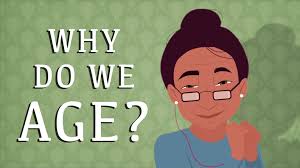Why do our bodies age?

Contents
Definition
There is no perfect or scientific definition of aging. It can only be defined as a change in structure and function of our body’s molecules and cells that happens solely due to the intrinsic processes and interaction with environmental elements like sunlight, toxins present in air and water, and our diets.
Process
Those changes are responsible for the decline of system inside the whole organism. However, scientists have identified nine physiological traits, from genetic changes to alterative ability of a cell’s regeneration. Our body tends to gather genetic damage as the it grows in the form of DNA lesions. This is due to body’s natural DNA replication and also in the non-dividing cells. The sensitive organs like mitochondria are prone to maximum damage. Mitochondria, also known as the power house of the cell, is the main energy production center for all cellular processes. It produces ATP, or Adenosine Tri Phosphate. Mitochondria is also responsible for all the cell activities. It is responsible for programmed cell death as well. Therefore, from this it can be concluded that failure of mitochondrial function would ultimately lead to failure of cells, and finally leading to destruction of organs. The patterns of genes are suppose to change also. This gives epigenetic alterations that has tremendous affect on body’s tissues and cells. Genetically features get prominent with age. This leads to identification of degenerative diseases in older people, like Alzheimer. Finally, these things pace the aging.
Without Genetic Alteration
But what would happen if we could avoid any of these genetic alterations? Would it save us? The answer is no. Our own cell cannot save us. It is known that as we grow older, our cellular regeneration also decreases. The DNA in our cells is packed within the chromosomes. Each of it has two protective regions at the extremities called telomeres. When cells replicate, they get shorten with every replication, and eventually die. This slows the body’s capability to renew or regain its own self. Cells also become increase its aging, as we grow old. It is the process that halts the cell cycle in times of risk. But the response also increases more as one ages, thus stopping cell growth and decreasing the power to replicate. Aging also take stem cells, in tissues, into account. The stem cells are responsible for the process of dividing without limits to replenish other cells. This process is pressed paused as we grow older, as stem cells gets minimized as well.
Conclusion
Other functions of cells are also affected as we age. The quality control on protein grows weaker hence it causes accumulation of damaged and toxic nutrients. These results in formation of extra metabolic activity that might be fatal for the body. Intercellular functions also reduce.
Therefore, there are many factors that might lead to a longer life like exercise, diet etc.
Jeanne Calment, a French lady lived for 122years and 164days and set the world record. Thus, ultimately it all comes down staying strong and living a good life.
Read More






Responses